Lawyering Peace
Episodes
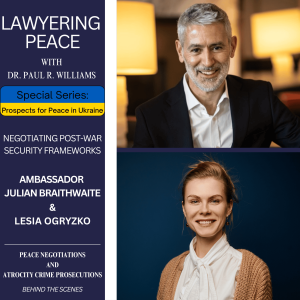
Wednesday Jun 18, 2025
A Post-War Security Framework for Ukraine with Lesia Ogryzko and Julian Braithwaite
Wednesday Jun 18, 2025
Wednesday Jun 18, 2025
What does it take to build lasting peace — and secure it?
What kind of security guarantees can truly deter renewed aggression?
In this episode of Lawyering Peace, Dr. Paul R. Williams is joined by Lesia Ogryzko, Director of the Sahaidachnyi Security Center, and Julian Braithwaite, former UK Ambassador to the UN and WTO, to unpack what a post-war security framework for Ukraine could and should look like.
Together, they explore how to negotiate credible security commitments that reflect the lessons of past failures — while embracing future-oriented strategies for deterrence, resilience, and international coordination.
From the role of the EU, US, and NATO, to the engagement of global players like China, India, and Brazil, the conversation examines how a pluralistic, robust security architecture can emerge from peace talks. The episode also confronts hard realities, including Russia’s continued threats and the challenges of military demilitarization demands.
🎧 Tune in for an expert dialogue on peace, power, and post-war security strategy.
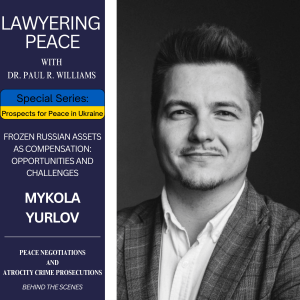
Friday Jun 06, 2025
Friday Jun 06, 2025
What are the legal and political pathways for using frozen Russian assets to compensate Ukraine?
And why has the transfer of these assets become a litmus test for the rules-based international order?
In this episode of Lawyering Peace, Ukrainian diplomat and legal expert Mykola Yurlov joins Dr. Paul R. Williams to discuss how frozen Russian sovereign assets could - and should - be used to support Ukraine’s reconstruction and deliver justice for victims of aggression.
Mykola held the position of Deputy Director of the Department of International Law and Cooperation at the Ministry of Justice, where he led both the International Disputes Unit and the Damage Compensation Unit. In these roles, he contributed to the development of an international compensation mechanism and to Ukraine’s proposal for a special tribunal for the crime of aggression. He also served as Senior Legal Counsel at Truth Hounds, a leading Ukrainian human rights organization documenting war crimes on the ground.
Mykola breaks down the legal foundation for asset transfers under international law, including the use of countermeasures and the principle of state responsibility. He outlines how these transfers would support the three-part international compensation mechanism: the Register of Damage, a future Claims Commission, and a Compensation Fund.
The conversation explores both the legal feasibility and the political resistance surrounding asset transfers, especially debates over sovereign immunity, reversibility, and potential financial precedent. Mykola explains why delay harms not only Ukraine, but the broader credibility of international law.
🎧 Tune in for a timely discussion on law, reparations, political will, and the global implications of frozen asset policy.
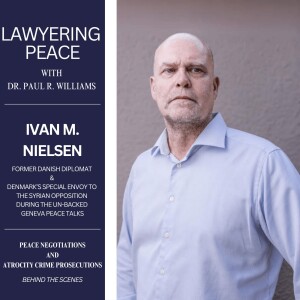
Thursday May 15, 2025
Behind the Geneva Talks: Ivan M. Nielsen Diplomacy and Peace in Syria
Thursday May 15, 2025
Thursday May 15, 2025
What do negotiations look like when one party to peace talks never intended to negotiate in good faith?What can we learn from peace talks that didn’t lead to peace?
In this episode of Lawyering Peace, former Danish diplomat Ivan M. Nielsen joins Dr. Paul R. Williams to reflect on his role as Denmark’s Special Envoy to the Syrian Opposition during the UN-backed Geneva peace talks.
Nielsen offers an insider's view of the Geneva process, describing how the Assad regime went through the motions of negotiation while continuing attacks on civilians—with Russia’s backing. He discusses the complex dynamics of engaging with a fragmented opposition, the structural challenges posed by the UN framework, and the difficulty of maintaining a meaningful diplomatic process under asymmetrical conditions.
Drawing on his experience in Syria, Iraq, Afghanistan, and South Africa, Nielsen shares core lessons that are important for both Syria and other post-conflict states. Nielson offers us a cautious but enduring message of optimism about Syria’s long road ahead.
🎧 Tune in for an insightful and thoughtful discussion on diplomacy, accountability, and the struggle for peace in Syria.
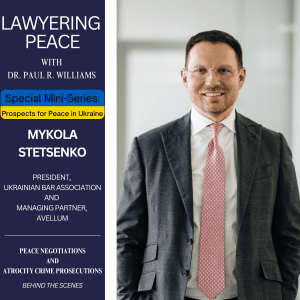
Monday Mar 24, 2025
Mykola Stetsenko on Ukraine's Path to Economic Renewal
Monday Mar 24, 2025
Monday Mar 24, 2025
In this episode of Lawyering Peace, we are joined by Mykola Stetsenko, President of the Ukrainian Bar Association, who speaks about the pivotal role of private sector investment in Ukraine’s post-war reconstruction. The conversation explores key industries primed for growth—agriculture, manufacturing, IT, energy, and logistics—as well as investment mechanisms such as public-private partnerships and industrial parks.
Stetsenko explains how Ukraine’s natural resource ownership model simplifies foreign investment, the government’s push to modernize industries rather than merely rebuild, and efforts to align with EU regulations. He also addresses common misconceptions about investing in Ukraine, the challenge of balancing economic development with environmental sustainability, and the policies designed to attract foreign investors by streamlining bureaucracy and fostering innovation.
With major multinationals already operating in the country and digital transformation reducing red tape, Ukraine presents compelling opportunities for forward-thinking investors. Tune in to discover how businesses can play a vital role in post-war recovery while seizing high-impact investment opportunities.
-----------------------Ukraine and its allies stand at a critical juncture as they pursue a just and lasting peace and an end to Russia’s war of aggression. The road ahead is fraught with difficult issues that will arise during a future peace process, from territorial integrity and post-war security frameworks to EU accession and justice and accountability.
In this special mini-series, Prospects for Peace In Ukraine, we sit down with Ukrainian and international experts in law, diplomacy, and peace negotiations to explore some of these key issues. Together, we examine the strategies, options, and opportunities ahead as Ukraine and its allies navigate the peace process against a shifting international landscape.
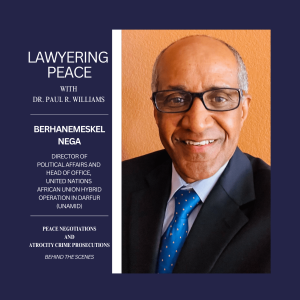
Tuesday Jan 21, 2025
Tuesday Jan 21, 2025
In this episode of Lawyering Peace, Berhanemeskel Nega, a seasoned diplomat with over 35 years of experience in multilateral diplomacy, mediation, and peacekeeping, takes us inside the challenges and lessons learned from the UN-AU hybrid peacekeeping mission in Darfur (UNAMID), where he served as Director of Political Affairs and Head of Office in Darfur from 2014 to 2020.
Drawing on his leadership roles in multiple UN missions, including as acting head of the UN integrated peacebuilding operation in Sierra Leone, Nega reflects on the complex political, humanitarian, and security context of Darfur during UNAMID’s tenure (2007–2020). He discusses navigating a resistant Sudanese government under Omar al-Bashir, the challenges of implementing the UN’s mandate, and the vital role peacekeepers play in protecting civilians in the world’s most volatile regions.
Nega critiques structural inefficiencies within the United Nations and highlights the inadequate legal protections for peacekeepers under international law, which left those charged with safeguarding civilians vulnerable to becoming targets themselves. Through his deep knowledge of peacekeeping in Darfur and Sierra Leone, Nega emphasizes the importance of addressing the root causes of conflict, rather than relying on superficial peace efforts, and examines the evolving role of the international community in building sustainable peace.
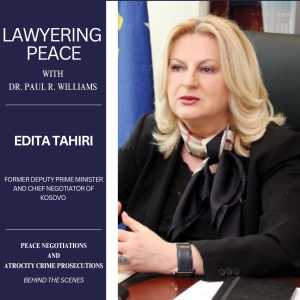
Tuesday Jan 07, 2025
Edita Tahiri: Trailblazer for Kosovo's Independence and Gender Equality
Tuesday Jan 07, 2025
Tuesday Jan 07, 2025
Meet Edita Tahiri, Kosovo's former Deputy Prime Minister and chief negotiator. From leading peace talks during the Rambouillet negotiations to championing gender equality in the Balkans, Edita shares her inspiring story of resilience, diplomacy, and the pursuit of peace. Discover her insights into unifying delegations, advocating for independence, and addressing the ongoing challenges of unfinished peace with Serbia.
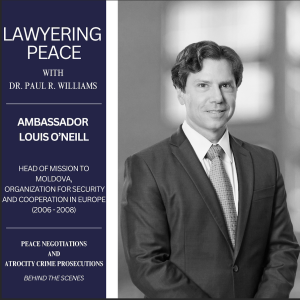
Monday Dec 16, 2024
Monday Dec 16, 2024
In this episode, Ambassador Lou O’Neill unpacks Moldova’s ongoing struggles with frozen conflicts in Transnistria and Gagauzia, the far-reaching ramifications of Russian influence, and how the war in Ukraine has reshaped the region’s dynamics.
Drawing from his tenure as OSCE Ambassador to Moldova (2006–2008), Lou provides critical insights into Moldova’s October 2024 EU accession and presidential election votes—controversial and closely contested, with EU accession winning by a narrow margin.
Lou reflects on cultural dynamics, offering insights into how Moldova can leverage its EU aspirations to foster unity and progress.
Discover how geopolitical strategies, diplomatic creativity, and evolving contexts could shape Moldova’s future in this pivotal episode.
-----------------
Host & Executive Producer: Dr. Paul R. Williams
Co-Producer & Content Manager: Katie Hetherington
Co-Producer & Creative Manager: Ryan Westlake
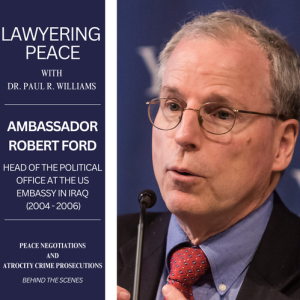
Thursday Oct 03, 2024
Thursday Oct 03, 2024
This episode of Lawyering Peace features part one of a conversation with Ambassador Robert Ford, who led the political office in the U.S. Embassy in Iraq from 2004 - 2006, during a pivotal time in the country’s history. Charged with helping Iraq rebuild its government, Ford offers a candid reflection on the challenges and lessons learned from the 2005 Iraqi elections—an event that was as much about international diplomacy as it was about democracy.
Key takeaways from the episode:
UN-led Process: The 2005 Iraqi elections were spearheaded by the UN, but the U.S. played a significant role in ensuring security, highlighting the complexities of balancing international and local dynamics.
Election Dynamics: The setup of the elections was influenced by various agendas, leading to unintended consequences, such as the Sunni boycott, which exacerbated existing political tensions.
The Importance of Communication: Ford underscores the critical need for effective communication within and between different U.S. entities, such as the military and the embassy, to navigate the delicate post-conflict environment.
Strategic Decisions: From promoting federalism to handling oil profits, Ford discusses the nuanced negotiations and strategic decisions that shaped Iraq’s transition from authoritarianism to democracy.
Robert Ford's insights offer a profound understanding of how elections, when not complemented by broader political processes, can sometimes deepen divides rather than bridge them.
Tune in to this episode for a deep dive into the realities of post-conflict elections and the lessons that can inform future peacebuilding efforts.
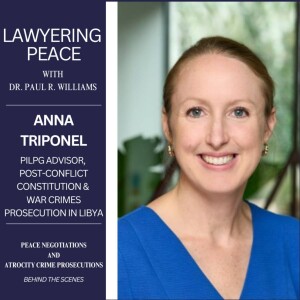
Thursday Jul 11, 2024
Anna Triponel: Peacebuilding in Post-Conflict Libya
Thursday Jul 11, 2024
Thursday Jul 11, 2024
In this episode of the Lawyering Peace podcast, Anna Triponel delves into the challenging yet hopeful post-Gaddafi era in Libya. After nearly 50 years of authoritarian rule, the nation faced the monumental task of building a new identity from the ground up, with no existing rule of law infrastructure or constitution. The Libyan people encountered a myriad of obstacles, including the widespread circulation of weapons and deep-seated distrust among various factions.
Anna, who led PILPG’s efforts to advise Libya on the post-conflict constitutional process and specifically headed the Libyan women’s cohort during this transformative period, discusses the initial enthusiasm for the constitution-building process. She highlights how this enthusiasm waned as the complexities of unifying a country with stark regional and ethnic differences became apparent. Anna emphasizes the difficulties of fostering loyalty to a national identity while respecting regional diversities and the critical role of building client relationships through understanding individuals' backgrounds and motivations.
One of the key highlights of the episode is Anna’s work with the Libyans to develop a domestic accountability mechanism for atrocity crimes, illustrating their desire for local justice over international interventions. The episode sheds light on the challenges faced when the International Criminal Court's involvement was undermined by militia power, highlighting the ongoing need for authentic reconciliation efforts in Libya.
Listeners will find valuable lessons in Anna’s reflections, particularly the significance of empathy and humility in international peace efforts. Her insights remind us that understanding the lived experiences of those we work with is paramount, as these issues are often matters of life and death.
This episode is a compelling exploration of the complexities of post-conflict nation-building and the human connections that underpin successful peace processes.
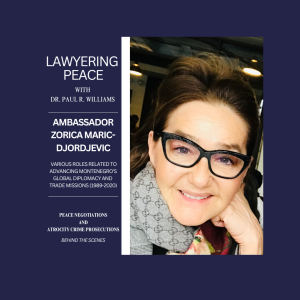
Wednesday May 08, 2024
Amb. Zorica Maric Djordjevic: Advancing Montenegro's Global Diplomacy (1989 - 2020)
Wednesday May 08, 2024
Wednesday May 08, 2024
In this unique episode, we speak with Ambassador Zorica Maric Djordjevic, to explore the subtleties of diplomacy and Montenegro's extraordinary journey in international relations. The discussion unveils Montenegro as an understated success story in U.S. foreign policy, spotlighting Ambassador Djordjevic’s instrumental role in enhancing ties with the U.S., the United Nations, and the World Trade Organization from 1989 to 2020.
Ambassador Djordjevic brings her unique perspectives from her time guiding Montenegro out of conflict and into statehood, emphasizing the importance of applying a gendered lens to negotiations.
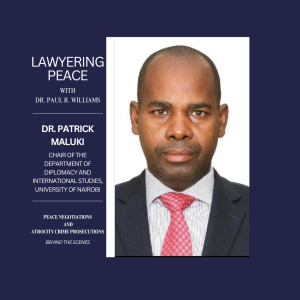
Wednesday Mar 13, 2024
Dr. Patrick Maluki: Leading Kenyan Academic on Conflict Mitigation and Mediation
Wednesday Mar 13, 2024
Wednesday Mar 13, 2024
Dr. Patrick Maluki is a Senior Lecturer at the University of Nairobi and Kenya’s top expert in peace and diplomacy. Dr. Maluki has extensive experience in the peace and conflict mediation arena. He holds a PhD in Peace and Conflict Studies from Masinde Muliro University of Science and Technology in Kenya and is an expert trainer and researcher in international negotiation, mediation, human rights, governance, and peace building issues. This episode focuses on Dr. Maluki’s in-depth knowledge of the causes of conflict, conflict prevention, and conflict mitigation.
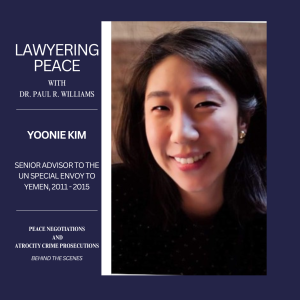
Wednesday Mar 13, 2024
Yoonie Kim: Yemen 2011 - 2015
Wednesday Mar 13, 2024
Wednesday Mar 13, 2024
Yoonie Kim is a former PILPG-er, and is currently a Senior Political Affairs Officer and the Gulf Team Leader at the United Nations. This episode explores Yoonie’s time serving as Senior Advisor and Special Assistant to the UN Special Envoy Jamal Benomar on the Yemen peace process, examining the ways in which mediation teams operate when supporting challenging and complex negotiations, and the importance of collaboration between the various actors involved in peace negotiations when pursuing durable peace.